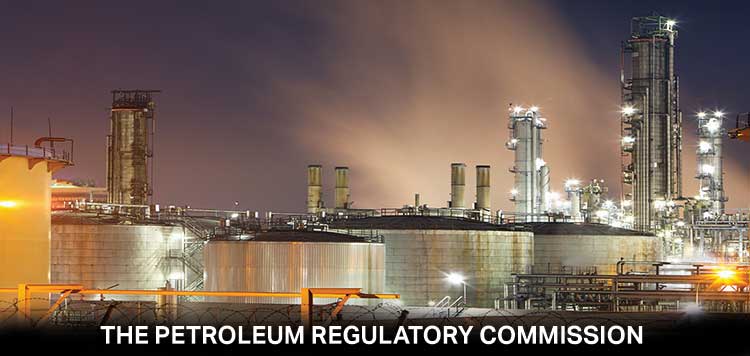The Petroleum Regulatory Commission is the entity that will be established as the sole regulator in the Nigerian Oil and Gas Industry once the Petroleum Industry Governance Bill is passed. Regulatory roles in the Nigerian oil and gas industry are currently being performed by the DPR, NNPC and a host of other agencies.This arrangement often led to overlapping of roles and incoherence in administration leading to multiplicity of tasks and inefficiency in management.
Originally,the Petroleum Industry Bill (PIB) made provisions for the creation of agencies to regulate both the technical and commercial operations of the petroleum sector value chain which comprises Upstream, Midstream and Downstream.However, due to envisaged multiplicity of roles,this arrangement was scraped off and instead replaced with a sole regulatory agency that would be responsible for both the technical and commercial operations.
The Petroleum Regulatory Commission (referred to henceforth as “the Commission”) is expected to assume all the rights, interests, obligations and liabilities of the Petroleum Inspectorate, the Department of Petroleum Resources (D.P.R) and the Petroleum Products Pricing Regulatory Agency.(P.P.P.R.A).The Commission would be run by a governing board drawn from industry experts.It will be constituted of a non-executive Chairman,one non-executive Commissioner, a Chief Commissioner ,three executive Commissioners (All to be appointed by the President subject to confirmation by the Senate) and one representative each who shall not be below the rank of a director in the Ministry of Petroleum Resources, Ministry responsible for Budgets and Ministry of Environment.
The Petroleum Minister is not required to chair this board and has little control over its operations.
The Roles of the Commission
As stated in an earlier article, the NPRC takes away the power to make regulations from the minister.The Commission will also act as an adviser to the Minister on fiscal and non-fiscal issues pertaining to the Petroleum industry.
It is expected that the Commission will be structured into 3 departments; Upstream, Downstream and Midstream with each of the 3 Executive Commissioners leading as the Head.
The scope of the commercial and technical regulatory role performed by the Commission includes;
- licenses, leases and permit terms compliance monitoring;
- administration and enforcement of policies, laws and regulations, environmental and technical standards;
- determination of tariff and pricing methodology for third party access to petroleum facilities;
- downstream operations licensing;
- control of the exploration of the frontier basins of Nigeria;
- conduct of bid rounds and other processes for the award of petroleum exploration and production licenses and leases.
- compute, determine, assess and ensure payment of royalties, rentals, fees, and other charges for upstream petroleum operations;
- ensuring accurate calibration and certification of equipment used for fiscal measures for the upstream petroleum operations and similarly for downstream operations;
- supervising and ensuring accurate calibration and certification of equipment used for fiscal measures.
The Supremacy of the NPRC
The Petroleum Industry Governance Bill (PIGB) makes provision for the Commission to have precedence over any existing laws that may be in contravention
Section 6(2)(b) states that the Commission shall notwithstanding the provisions of any other law or regulations, exclusively supervise and ensure accurate calibration and certification of equipment used for fiscal measures in the industry. Section 6(4)(b) further states that Notwithstanding the provisions of any other law or regulation, no Government agency shall exercise any powers and functions in relation to the petroleum industry in conflict with the powers and functions of the Commission.
In effect, all government agencies exercising any prior lawful powers and functions in relation to the petroleum industry are now required to Consult with the Commission.
Decision Making in the Commission
The commission is expected to issue written reasons for its decision and orders affecting the existing rights of any person, if the affected person requests such written reasons.The Commission may on its own initiative or at the request of any person directly affected by such an order, approach the Federal High Court for unresolved disputes.
The Bill also stipulates that in carrying out its functions,all members of the board must exercise independent judgment. This means that a director shall not subordinate its powers to the will of others.Directors may seek advice but it is their exclusive prerogative to follow such advice or not. Funding
The Commission will be required to submit budget for appropriation to meet their expenditure and operational costs.Surpluses in the fund at the end of each financial year, which was not utilized by the activities of the Commission shall be paid into the Consolidated Revenue Fund.
On monies received, the commission is required to pay into the Federation account all monies accruing from upstream leases,bonuses,lease renewal fees,assignment fees and concession rentals.All other monies accruing from its activities such as fires, penalties shall be paid into the Consolidated Revenue Fund.
This rules out the possibility of the Commission to first withdraw money for its funding needs before making remittance as is the present situation in the Nigerian National Petroleum Corporation (N.N.P.C).Also, the Commission is empowered to establish a Special Investigative Unit with Powers to investigate acts which may constitute offenses.The Commission is also required to collaborate with other security agencies ,acting as a watchdog in keeping surveillance on oil and gas installations, vessels and premises.

